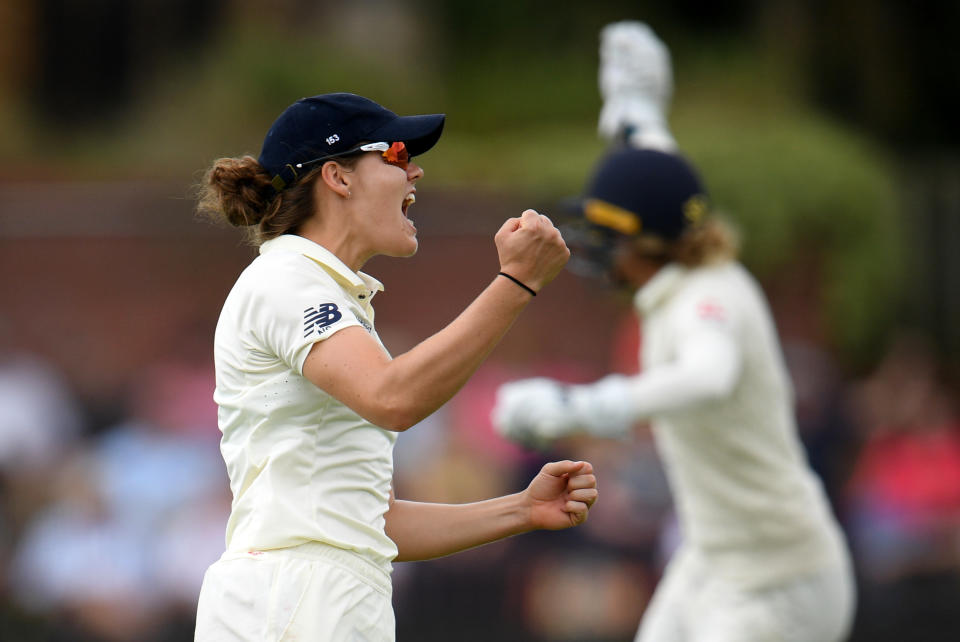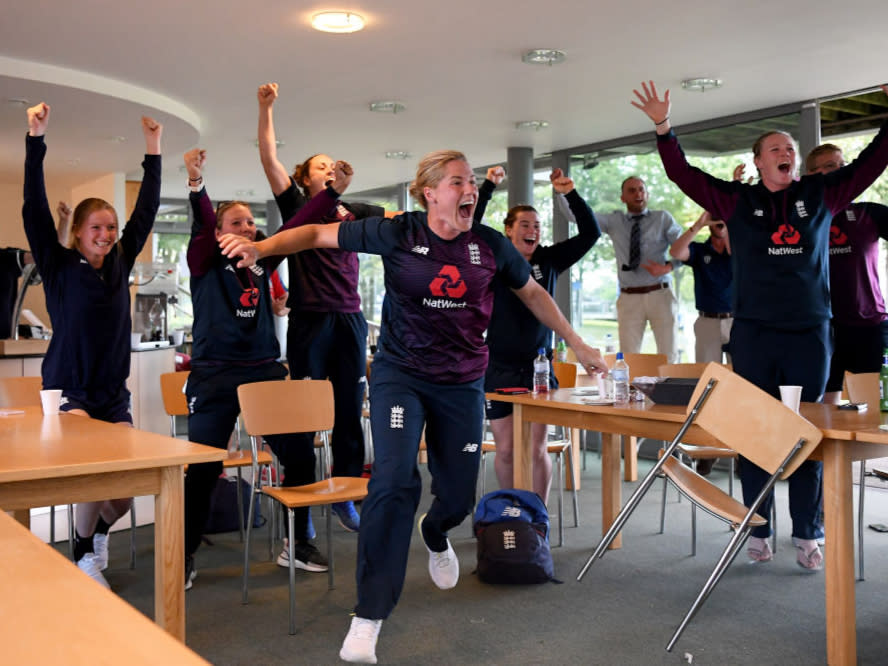England hope West Indies T20 series can spark new sustainable era for women’s cricket

19 September 2020 was a day Nat Sciver and Katherine Brunt had looked forward to. One spawned on 23 June 2017, when Brunt put herself out there on the home balcony at Lord’s after England had dramatically beaten India in the World Cup Final. There were two life-changing wins that day.
Brunt would be the one to put herself out there again on New Year’s Eve two years ago, asking Sciver to marry her. From that moment on, all eyes were on Saturday just gone, picked especially not to clash with international series with India and South Africa, along with the debut season of the women’s Hundred, which both would have played a prominent part in.
Instead, Covid-19 scrapped it all: the fixtures and the wedding. And instead of being in the picturesque surroundings of Chamonix, a ski resort in France that also hugs the border of Switzerland and Italy, they were in a bio-secure bubble in Derby, ahead of five cobbled together Twenty20 matches against West Indies, starting from Monday (6pm), all to be played at Derbyshire's Incora County Ground.
But on the whim of England teammate Amy Jones, who was due to be Brunt’s maid of honour, with assistance from England captain Heather Knight and media manager Henry Cowen, a surprise celebration was put on, complete with veils and a cake. A date that was due to bring so much joy was not allowed to slip sadly by.
“Big night, last night. Bit of a slow morning,” joked Sciver. “It was bittersweet. Bit of a weird one, but a really nice surprise from Amy and Heather and Henry who coordinated some things for us. It was nice in the end, a nice celebration.

“We were going to be in the mountains. Hopefully, the weather was going to be nice. I actually looked at the weather and it said it was going to rain in the afternoon. So maybe it was not a bad thing.”
The imminent return to international duty can aid the sense of disappointment, one which has carried through ever since the remarkable high of March’s World Twenty20 Final. That, too, was a date (8 March) that was supposed to make the beginning of the rest of the lives of all women’s cricket. A crowd of over 86,000 filling the Melbourne Cricket Ground marking the start of an even newer, more sustainable era in women’s cricket.
Now, after a hiatus that has not just drastically hampered the progression of women’s sport but taken chunks out of its foundations, there is a real danger of that date becoming a line in the sand.
As such, the ECB getting a series on at all - again with the help of the West Indies Cricket Board - alongside pushing through their high-performance blueprint of eight regional hubs and 25 regional player contracts, and the subsequent playing of domestic cricket in the form of the Rachel Heyhoe Flint Trophy, should not be downplayed.
It won’t be by the players, who themselves have lived in a bio-secure bubble for around two months, of which a portion was spent knowing India and South Africa would not be making it over. Just as the tedium of bubble life was looking to be for nothing, confirmation of the West Indies tour was the light at the end of the tunnel.
"We’ve been together for what feels like a while now. We started this bubble (for the West Indies) at the start of the month. It’s been a long time coming, really. I can safely say that everyone is ready to go. We had 24 of us so we could play intra-squad games and it was good to prepare in that way.”
The nature of bubble-life - close and regular interactions with the coaching staff and few distractions - means players have had more concentrated time with the head coach, Lisa Keightley. It is coming up to a year since the Australian took over, but this will only be the third series she has overseen following a limited-overs tour against Pakistan at the end of 2019 and the T20 World Cup.
“We never usually this long a build-up into a series," said Sciver of the time spent together. "We’ve not had this long to get things right and prepare as long as we have done. It’s been to good to have that input from Lisa, and Tim McDonald as well - our bowling coach - consistently really.”
“Before we went back to training we all each individually had a meeting with Lisa and the coaches to go through anything that we wanted to work on, and through the stats that we’ve had in the last few years to see if there was any areas we can improve, really.”
For Sciver, the talk was around her bowling, namely making her action more efficient, which involved working with McDonald. While she’s unsure if he will unlock any extra yards in her practical right-arm seam straight away, there is a hope the allrounder can become more of an all-round package.
Batting is the superior skill, as showcased earlier this year with 202 runs from just four innings (at an average of 63) in the World Cup, which put her top of England’s scorers and third overall.
“I’d like to be number one allrounder in the world at some point in my career. That’s something. I wanted to achieve. Hopefully, I’ve got a few years left to do that.”

Aged 28, she absolutely does, though the route to that summit is different in both white-ball formats. She is eighth in ODIs but on the podium in third for T20is, with Ellyse Perry (Australia) and Sophie Devine (New Zealand) the number ones in those respective codes.
And it's worth looking at the England team Sciver is in with its well-stocked shelves of twirling allrounders to realise how much value a regular wicket-taking pace option could be, especially housed within its best batter, who has made a home for herself higher up the order and is likely to continue to bat three in this series.
“I guess being a senior player comes with certain responsibility’s and I think I play better with a bit of responsibility. It’s been a good journey. It feels like only yesterday I made my debut at Louth CC (2013).
“I think I just need to keep trying to be consistent. I’ve tried to be a game-changer in any format, really, trying and swing it back our way and influencing the game from any position, really.”
The challenge of a well-known West Indies side is not lost on Sciver or the England set-up, though the lack of Anisa Mohammed in the travelling party means T20i’s most prolific bowler remains in the Caribbean. Nevertheless, the 2016 champions in the format boast a dynamic side with plenty of experience – 14 of the squad were at the World Cup – and a captain in Stafanie Taylor who leads them from the front.
“We can never take the West Indian team lightly,” said Sciver. “They’ve got people who can change the game all the way down the order with the bat. Once they get a few wickets in a row they just squeeze you and make it really difficult for you as a team. I guess as a team we’ve got to be ruthless right to the end.”
Beyond the on-field pressure is the need to entertain. This is the first full-member women’s series, one which will closely be followed by Australia’s tour of New Zealand. The five T20is are to be broadcast on Sky Sports and made available through their YouTube channel, and will also feature the DRS review system for the first time in a women’s bilateral series.
Leaving the MCG that day, no one could have imagined a scenario where the England Women’s team would have to be grateful for five Twenty20s at the end of the season achieved through something of an administrative Hail Mary. But as women’s cricket builds itself back up from a standing start, there is still no reason that six months on, Monday cannot be the beginning of this newer, sustainable era.

